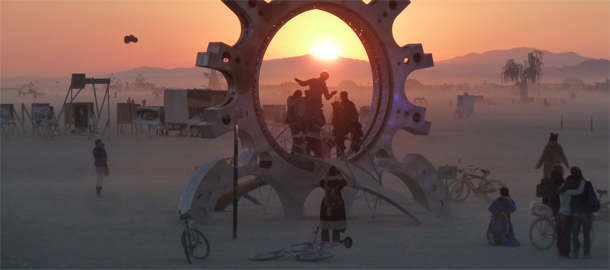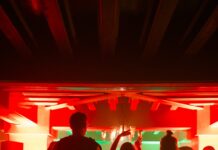
Text: Magda, Picture credit: Andrew Fresh
A German translation of this article has been published in Groove 133 (November/December 2011)
Stepping onto the cracked earth of the Black Rock Desert feels like stepping onto Mars. The sand storms on the flat plane give no sign of life beyond the dusty horizon. Your only sense of reality is what you see in front of you. This is your life for a week. A life in a temporary city built up from scratch in the middle of a desert, made of tents that are torn down or burnt afterwards. Nothing remains.
And nothing at Burning Man Festival is on a conventional schedule. It is standard that djs miss their time slots for various reasons. I, too, was late for my set at the party tent Nexus because we got lost. There is so much happening at night that everywhere you turn there is chaos and your brain is flooded with information from hundreds of blinking lights, not to mention all the sound systems. I had to laugh to myself at this moment. I was on my bike in a leopard pirate outfit and with a turban on my head. My equipment was on my back and my face was almost completely covered against the desert dust. After stopping at various tents we finally found Nexus. What a different adventure it was to step in the dj booth and start playing to a crowd of people who are completely dressed up in the desert in a crazy looking structure like the sphere of Nexus! It’s surreal and you’re not sure where you are.
The entire Burning Man city in the desert is so big that I did not make it to the other side very often. I was accomodated in a camper van in a camp called Liquid Sky, named after the obscure Eighties film from New York. There were about eighty of us in this community. I remember walking in one evening and Damian Lazarus was on the mic dressed up as a cat playing country western music while everyone did the limbo. I loved it. So much different music seems to fit in that kind of environment. And for some reason the music sounds so clean and deep in the desert. Perhaps it’s the open space or the mountains in the distance. Our friends from Wolf + Lamb were camped just around the corner, so we would bike there and stumble upon a party in their tent as well. You just drop your bike and go to dance.
But Burning Man is not just a music festival. It’s a gathering of people of all ages and from all different backgrounds. It’s a true expression of human creativity. I have never seen anything like it. When you gather that many people in a desert the energy is incredible. Add huge sound systems to that and it’s an experience no one will ever forget. Especially my last night, when we watched the man burn: On the penultimate night of the event, the people who run the festival burn a 12 meter high wooden statue of a man. The Burning Man. On the next night they burn the temple as well – the other symbolic structure which is even bigger. To me it’s a sign of letting go of material things – like a sacrifice in a way. Because every year this city is built up for months and then these two structures are burned to signify its end. Everyone was either close to the fire or on the roofs of their camper vans. Fiftythousand people – what a sight! We are all still buzzing with memories and cannot wait for next year.
Burning Man 2011
August 29th – September 5th
Black Rock Desert, Nevada, USA
Video: Burning Man 2011 (by Tripak)




